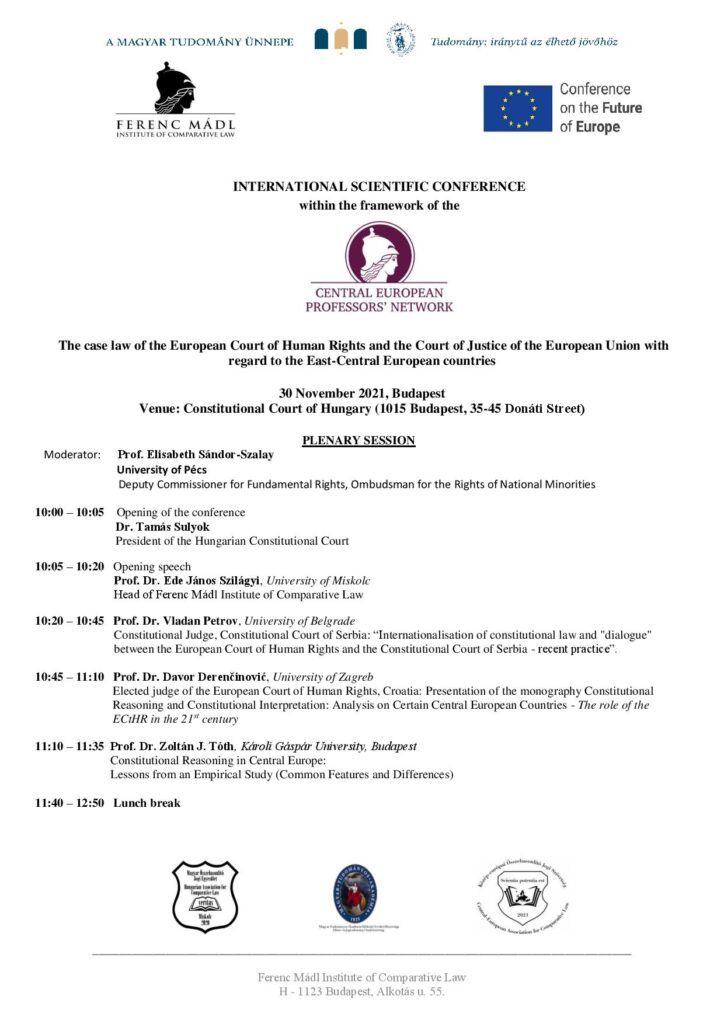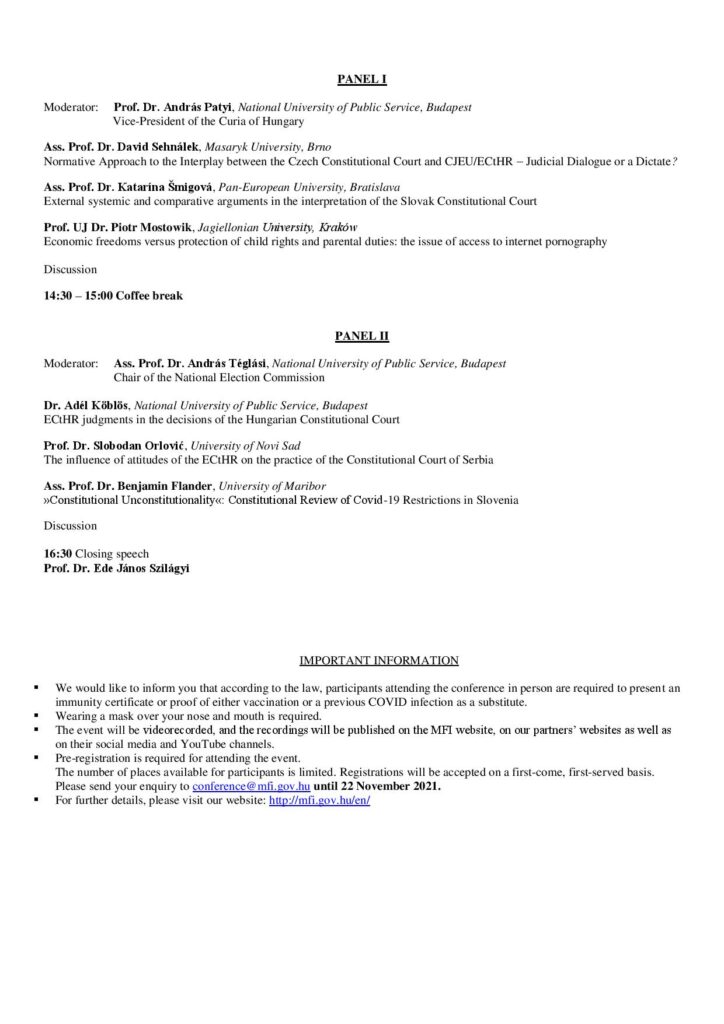The Central European Professors’ Network, consisting of four research groups, launched its activities on 1 January 2021 to conduct research on a great variety of issues with regard to seven Central European countries (Hungary, Poland, Czech Republic, Croatia, Slovakia, Slovenia, Serbia). The Professors’ Network organises events with the primary aim to draw attention of the European citizens to the topics which are important and significant in connection with the future of Europe, in particular of Central Europe.
One of the research groups dealt with fundamental rights in Central Europe and the comparative analysis of the constitutional situation in Central Europe. Furthermore, the group focused on the comparative legal methodological analysis of the comparison with the similar methodology of the European Court of Human Rights.
The conference on the above issue will also function as a book launch of the book „Constitutional Reasoning and Constitutional Interpretation – Analysis on Certain Central European Countries” written by the members of the research group. Therefore, besides the conference presentations, the comparative legal book will also be presented as the main achievement of the research team. This book is a gap-filling contribution in the field of comparative constitutional law and a publication which sheds light on the most important Central European aspects of the issue.
The main organisers of the event are the Ferenc Mádl Institute of Comparative Law, the Hungarian Association for Comparative Law and the Central-European Association for Comparative Law.
Report on the International Scientific Conference[1]
The scientific conference ‘The Case Law of the European Court of Human Rights and the Court of Justice of the European Union with regard to the East-Central European Countries’ was held at the Constitutional Court of Hungary on 30 November 2021 as the fourth element of the closing events of the Central European Professors’ Network in 2021. The event hosted a book launch as well: The members of the research group ‘Interpretation of fundamental rights in Europe’ presented their book, ‘Constitutional Reasoning and Constitutional Interpretation’ which summarizes their results.
Prof. Dr. Ede János Szilágyi (University of Miskolc), the head of Ferenc Mádl Institute of Comparative Law (hereinafter: FMI) in his introductory speech presented the outcomes and results of the Central European Professors’ Network coordinated by the FMI, which was established to create and organise a Central European professional network through closer partnership. As Dr. Judit Varga, the Minister of Justice of Hungary pointed out, the initiative also aims at ‘[…] establishing a professional community and knowledge base that can present a credible national, conservative, Christian-democratic alternative to the liberal and federalist direction.’
Prof. Dr. Zoltán Tóth J. (Károli Gáspár University of the Reformed Church in Hungary) first introduced the members of the research group ‘Interpreting fundamental rights in Europe’, by name: Benjamin Flander, Adél Köblös, Piotr Mostowik, Slobodan Orlović, David Sehnálek és Katarína Šmigová. Then Professor Tóth introduced the achievements of the research group: A 468 pages long comparative law book, divided into seven chapters. The book is titled ‘Constitutional Reasoning and Constitutional Interpretation’. The book is based on a remarkable research: The members of the research group analysed 180 national constitutional court decisions, as well as 180 ECtHR and CJEU decisions respectively. During the research the members of the research group, inter alia, examined how often the national constitutional courts refer to academic literature and the conditions of restricting the basic rights.
In the end of the conference Professor Szilágyi added his final remarks and said thank you for the annual cooperation and the fruitful research. At this point, certificates were also granted to the participating presenters. Additionally, any presenters were invited to join the Central-European Association of Comparative Law, which was set up in 2021 in order to conduct comparative law researches, write papers related to private and public law, as well as European and international law, focusing on the Central-Eastern-European region, and to formulate proposals and opinions for the academic community of the Central-Eastern-European region, international organisations and public bodies, in particular legislators and law enforcement bodies, with special regard to the promotion and development of the application of certain legal instruments homeland and abroad.
[1] Authors: Nóra Béres* & György Marinkás**
*Researcher, Department of Public Law, Ferenc Mádl Institute of Comparative Law, nora.beres@mfi.gov.hu; assistant lecturer, Department of International Law and Comparative Law, Institute of European and International Law, Faculty of Law, University of Miskolc, jognora@uni-miskolc.hu
**Researcher, Department of International and EU Law, Ferenc Mádl Institute of Comparative Law, gyorgy.marinkas@mfi.gov.hu; senior lecturer, Department of European Law and International Private Law, Institute of European and International Law, Faculty of Law, University of Miskolc, joggyuri@uni-miskolc.hu



